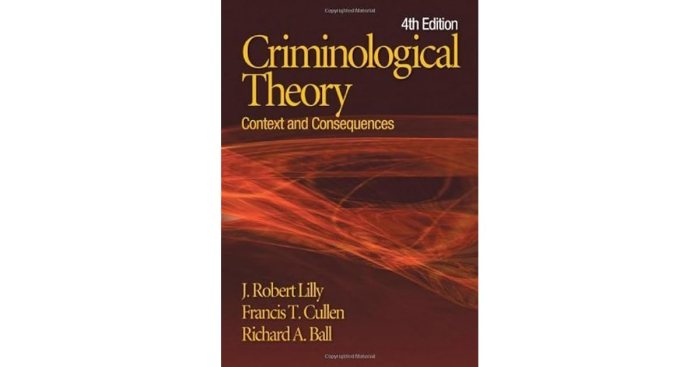Criminological theory context and consequences 7th edition – Criminological Theory, Context, and Consequences, 7th Edition, invites readers to delve into the captivating world of criminology. This comprehensive text provides a thorough examination of the historical development, major theoretical perspectives, and practical applications of criminological theory.
From the foundational principles of biological, psychological, sociological, and environmental theories to the exploration of contextual factors shaping crime and criminal behavior, this book offers a multifaceted understanding of the complexities of criminal activity.
Theoretical Foundations: Criminological Theory Context And Consequences 7th Edition

The study of criminological theory has a rich history, dating back to the 18th century. Early theories focused on the individual offender, emphasizing biological and psychological factors as the primary causes of crime. In the 20th century, sociological theories emerged, which emphasized the role of social and environmental factors in shaping criminal behavior.
Biological Theories
- Genetic Theories:Suggest that certain genes or genetic predispositions may increase an individual’s risk for criminal behavior.
- Neurological Theories:Focus on the role of brain abnormalities or dysfunctions in the development of criminal behavior.
- Biochemical Theories:Propose that imbalances in neurotransmitters or other biochemical substances in the body can contribute to criminal behavior.
Psychological Theories
- Psychoanalytic Theories:Emphasize the role of unconscious conflicts and early childhood experiences in the development of criminal behavior.
- Behavioral Theories:Focus on the role of learning and conditioning in the development of criminal behavior.
- Cognitive Theories:Emphasize the role of cognitive processes, such as distorted thinking patterns, in the development of criminal behavior.
Sociological Theories, Criminological theory context and consequences 7th edition
- Social Control Theories:Propose that crime occurs when social bonds to society are weak or broken.
- Strain Theories:Suggest that crime is a response to social inequality and the inability to achieve legitimate goals.
- Social Learning Theories:Emphasize the role of social interactions and modeling in the development of criminal behavior.
- Environmental Theories:Focus on the role of physical and social environments in shaping criminal behavior.
Environmental Theories
- Routine Activity Theory:Proposes that crime occurs when a motivated offender encounters a suitable target in the absence of a capable guardian.
- Broken Windows Theory:Suggests that visible signs of disorder and neglect in a community can lead to increased crime rates.
- Place Theory:Emphasizes the role of specific geographic locations in shaping crime patterns.
Quick FAQs
What are the major theoretical perspectives in criminology?
Criminological theory encompasses a wide range of perspectives, including biological, psychological, sociological, and environmental theories, each offering unique insights into the causes and patterns of crime.
How do contextual factors influence crime?
Contextual factors, such as social, economic, and political conditions, play a significant role in shaping crime and criminal behavior. These factors can influence individual and community-level risk factors for crime.
What are the consequences of crime?
Crime has far-reaching consequences for victims, offenders, and society as a whole. These consequences include economic, social, and psychological costs, which can be both short-term and long-term.
